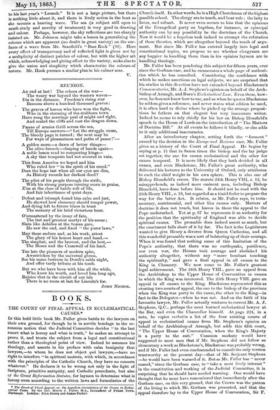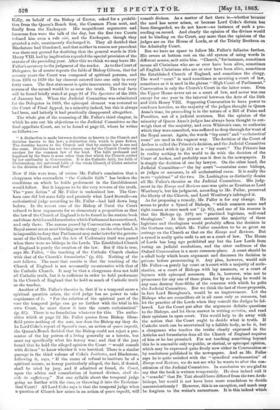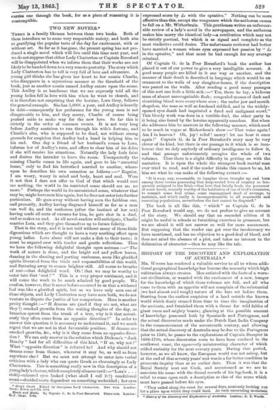BOOKS.
THE COURT OF FINAL APPEAL IN ECCLESIASTICAL CAUSES.* Isr this bold little book Mr. Fuller gives battle to the lawyers on their own ground, for though he is in servile bondage to the er- roneous notion that the Judicial Committee decides "in the last resort what is heresy and what is truth," he makes an attempt to prove it, and treats the subject from a legal and constitutional rather than a theological point of view. Indeed he assumes his theology, and asserts in his preface with calm benignity that lawyers,—to whom he does not object quit' lawyers,—have no right to interfere "in spiritual matters, with which, in accordance with the principles of the Catholic Church, they have no concern whatever." He declares it to be wrong not only in the light of Scripture, primitive antiquity, and Catholic precedents, but also of the Great Reformation Statutes, for laymen to determine what is heresy even according to the written laws and formularies of the
• The Court of Final Appeal; or, the Appellate Jurisdiction of the Crown in Ecclesi- astical Cases. By the Rey. Morrie J. Fuller, M.A., Incumbent of Prince Town, Dartmoor. London: JoLn Henry and Jatnea Parker.
Church itself. In other words, he is a High Churchman of the highest. possible school. The clergy are to teach, and bear rule ; the laity to listen, and submit. It never even occurs to him that the opinions of the Evangelical party on baptism, for instance, or episcopal authority can by any possibility be the doctrines of the Church.
Now it would be a hopeless task indeed to attempt the refutation of these theories, which are altogether beyond the reach of argu- ment. But since Mr. Fuller has entered largely into legal and constitutional topics, we propose to see whether clergymen are any happier in handling them than in his opinion laymen are in handling theology.
Mr. Fuller has been pondering this subject for fifteen years, ever since the Gorham case, and he enumerates a whole page of authori- ties which he has consulted. Considering the confidence with which he makes assertions on legal subjects, we are surprised that his studies in this direction have not extended beyond Blackstone'a Commmentaries, Mr. A. J. Stephens's opinion on behalf of the Arch- bishop of Armagh, and Burn's Ecclesiastical Law. Even these, how- ever, he does not know how to use, and as when he quotes Blackstone Ile seldom gives a reference, and never states what edition he used, it is often hard to divine where he picked up the strange proposi- tions he fathers on that elegant but very inaccurate writer. Indeed he seems to rely chiefly for his law on Bishop Blomfield's speech in the House of Lords on the introduction of "The Matters of Doctrine Bill." At all events he follows it blindly, or else adds to it only additional inaccuracies.
After an introductory chapter, setting forth the " ferment " caused by the decision in the Essays and Reviews case, Mr. Fuller gives us a history of the Court of Final Appeal. He begins by saying at p. 11 that in Saxon times the bishop and the lay judge sat together, the one for causes ecclesiastical and the other for causes temporal. It is more likely that they both decided in all causes, and even Blackstone, Mr. Fuller's great authority, who delivered his lectures to the University of Oxford, only attributes to each the chief weight in his own sphere. This is also one of Bishop Blomfield's errors. The statute 24th Henry VIII, c. 12, he misapprehends, as indeed more eminent men, including Bishop Blomfield, have done before him. It should not be read with the 25th Henry VIII., c. 19, but regarded as a timid feeler to prepare the way for the latter Act. It relates, as Mr. Fuller says, to testa- mentary, matrimonial, and other like causes only. Matters of doctrine it does not touch, but leaves in these the appeal to the Pope undisturbed. Yet at p. 67 he represents it as authority for the position that the spiritualty of England was able to decide spiritual causes. The preamble does indeed assert as much, but the enactment falls short of it by far. The fact is the Legislature wanted to give Henry a divorce from Queen Catherine, and all this wonderful preamble was a sort of bolstering up of their courage. When it was found that nothing came of this limitation of the Pope's authority, that there was no earthquake, pestilence, nor even war, the Houses took courage and abolished his authority altogether, without any "more bombast touching the spiritualty," and gave a final appeal in all causes to the King in Chancery. We now come to Mr. Fuller's greatest legal achievement. The 24th Henry VIII., gave an appeal from the Archbishop to the Upper House of Convocation in causes in which the King was interested. The 25th Henry VIII. gave an appeal in all causes to the King. Blackstone represented this as creating two courts of appeal, the one to the bishop of the province when the King was party to the cause, the other to the King—in fact to the Delegates—when he was not. And on the faith of his favourite lawyer, Mr. Fuller actually ventures to correct Mr. A. J. Stephens, Q.C., perhaps the most learned ecclesiastical lawyer at the Bar, and even the Chancellor himself. At page 224, in a note, he copies verbatim a list of the four existing courts of appeal in ecclesiastical causes from Mr. Stephens's opinion on behalf of the Archbishop of Armagh, but adds this fifth court, "The Upper House of Convocation, when the King's Majesty is a party to the suit." Common modesty would have suggested to most men that if Mr. Stephens did not follow so elementary a work as Blackstone's, Blackstone was probably wrong, and if Mr. Fuller had even condescended to consult the only version trustworthy at the present day—that of Mr. Serjeant Stephens —he would have been warned of it. But as Mr. Fuller has "never ceased," since the Gorham caw, to "take a most lively interest" in the constitution and working of the Judicial Committee, it is surprising that he should have needed warning. One would have thought that he must have remembered that immediately after the Gorham case, on this very ground, that the Crown was the patron of the living to which Mr. Gorham was presented, and that the appeal therefore lay to the Upper House of Convocation, Sir F.
Kelly, on behalf of the Bishop of Exeter, asked for a prohibi- tion from the Queen's Bench first, the Common Pleas next, and finally from the Exchequer. His magnificent arguments and immense fees were the talk of the day, but the first two Courts refused him even a rule nisi, and the Exchequer, though they granted a rule, unanimously discharged it. They all decided that Blackstone had blundered, and that neither in reason nor precedent was there any ground for doubting that the general words in 25th Henry VIII. had by implication repealed the special provision of the statute of the preceding year. After this we think we may leave Mr. Fuller's accuracy to the judgment of the reader. As to the Court of Delegates, he of course repeats the fable of Bishop Gibson, that for seventy years the Court was composed of spiritual persons, and from 1604 to 1639 the lay element entered into one only in every forty cases. The first statement is quite inaccurrate, and the very reverse of the second would be as near the truth. The real facts will be found briefly stated at page 91 of The Spectator of the 28th of January last. When the Judicial Committee was substituted I or the Delegates in 1833, the episcopal element VMS restored to the Court of Final Appeal, in a minority indeed, but this it always bad been, and latterly it had practically disappeared altogether.
The whole gist of the reasoning of Mr. Fuller's third chapter, in which he sets out his objections to the Judicial Committee as the final appellate Court, are to be found at page 63, where he writes as follows :—
"A distinction is made between doctrine as known to the Church and doctrine known to the law; a distinction this, which is pure fiction. The doctrine known to the Church and that by statute law is one and the same. Doctrine has not two phases, one for the Church Courts and another for the common law of the land. The faith professed and legalized by the State is none other than that which the Church settled by her spiritualty in Convocation. It is the Catholic faith, the faith of Christendom, the universal faith of the whole Church of Christ anterior to the division of East and West."
Now if this were true, of course Mr. Fuller's conclusion that a clergyman who contradicts "the Catholic faith" has broken the conditions on which he holds preferment in the Establishment would follow. But it happens to be the very reverse of the truth. The "pure fiction" of Mr. Fuller is undoubted law. The Gor- ham case did but state fully and precisely what Lord Stowell—an ecclesiastical judge according to Mr. Fuller—had laid down long before. In the recent case of the Bishop of Natal the Court refused to hear arguments for so elementary a proposition as that the law of the Church of England is to be found in the statute book and those Articles and formularies which Parliament has sanctioned, and only there. The canons passed by Convocation even with the Royal assent are at most binding on the clergy; on the other hand, it is impossible to deny that Parliament may make laws for the govern- ment of the Church, and the Act of Uuiformity itself was passed when there were no bishops in the Lords. The Established Church -of England is purely the creation of the law. But if this is true, says Mr. Fuller, "the teaching of the Catholic Church clashes -with that of the Church's formularies" (p. 65). Nothing of the sort follows. The most that results is that the teaching of the Church of England is not necessarily co-extensive with that of the Catholic Church. It may be that a clergyman does not hold all Catholic truth, but it is sufficient in order to hold preferment in the Church of England that he hold so much of Catholic truth as she teaches.
Another of Mr. Fuller's theories is, that if in a temporal cause a spiritual question arises, the civil judge has no power to take cognizance of it. "For the solution of the spiritual part of the case the temporal judge can go no further with the trial in his own Court, he must throw it into the courts ecclesiastical" (p. 66). There is no foundation whatever for this. The autho- rities which at page 92 Mr. Fuller quotes from Bishop Blom- held prove nothing of the sort, nor does the Bishop say they do. In Lord Coke's report of Specot's case, an action of quare impedit, the Queen's Bench decided that the Bishop could not reject a pre- sentee of the lay patron of a living generally as a heretic, but must say specifically what his heresy was ; and that if the jury found that he held the alleged opinion the Court "would consult with divines" to know whether it was heretical. There is a similar passage in the third volume of Coke's Institutes, and Blackstone, following it, says, "If the cause of refusal to institute be of a spiritual nature, as heresy particularly alleged, the fact, if denied, shall be tried by jury, and if admitted or found, the Court, upon the advice and consultation of learned divines, shall de- cide its sufficiency." Not one syllable about the temporal judge going no further with the case, or throwing it into the Ecclesias- tical Court! All Lord Coke says is that the temporal judge when a question of Church law arises in an action of quare impedit, will
consult divines. As a matter of fact there is—whether because the need has never arisen, or because Lord Coke's dictum has been disregarded, we do not know—no instance of such a pro- ceeding on record. And clearly the opinion of the divines would not be binding on the Court, any more than the opinions of the judges are on the House of Lords, or of the Trinity Brethren on the Admiralty Court.
But we have no space to follow Mr. Fuller's fallacies farther. His errors at bottom rest on the old system of using words in different senses, as it suits him. "Church," for instance, sometimes means all Christians who are or ever have been alive, sometimes all English Christians who are or ever have been alive, sometimes the Established Church of England, and sometimes the clergy. The word "court" is used sometimes as meaning a court of law, sometimes as it is used in the phrase "High Court of Parliament." Convocation is only the Church's Court in the latter sense. Even the Upper House never sat as a court of law, and never was one except for one year in the interval between the Acts of the 24th and 25th Henry VIII. Supposing Convocation to have power to condemn heretics, as the majority of the judges thought in Queen Anne's time, its proceeding is in the nature of a Bill of Pains and Penalties, not of a judicial Sentence. But the opinion of the minority of Queen Anne's judges has always been thought to out- weigh that of the majority, and even Whiston's case, to authorize which they were consulted, was suffered to drop through for want of the Royal assent. Again, the words "lay court" and "ecclesiastical court" are used in the vaguest way. The decision of the Court of Arches is called the Primate's decision, and the Judicial Committee is contrasted with it (p. 51) as a "lay court." The Primate has in reality nothing in the world to do with the decision of the Court of Arches, and probably sees it first in the newspapers. It is simply the decision of one lay lawyer. On the other hand, the Judicial Committee—" the lay court "—contains some bishops, as judges or assessors, in all ecclesiastical cases. It is really the more " spiritual " of the two. Dr. Lushington as distinctly denies all Mr. Fuller's theories as the Judicial Committee. His judg- ment in the Essays and Reviews case was quite as Erastian as Lord We,stbury's, but his judgment, according to Mr. Fuller, preserved the liberty of the Church, and Lord Westbury's infringed it.
As for proposing a remedy, Mr. Fuller is for any change. He seems to prefer a Synod of Bishops, "which common sense and right reason at once mark oat" (p. 81), and one of his reasons is that the Bishops (p. 228) are "practised logicians, well-read theologians." At the present moment the majority of these logicians and theologians would probably affirm the decision in the Gorham case, which Mr. Fuller considers to be as great an outrage on the Church as that on the Essays and Reviews. But a synod is really quite unfit to act as a court of law. The House of Lords has long ago prohibited any but the Law Lords from voting on judicial resolutions, and the utter unfitness of the Oxford Convocation is a mere common-place. A court should be a sffiall body which hears argument and discusses its decision in private before pronouncing it. Any plan, however, would suit Mr. Fuller—a purely lay court or h court with a majority of eccle- siastics, or a court of Bishops with lay assessors, or a court of laymen with episcopal assessors. He is, however, wise not to pronounce for any one of these plans, for by so doing he would in any case destroy four-fifths of the censures with which he pelts the Judicial Committee. But we think the last of these proposals, in fact Lord Brougham's, would be an improvement. Let the Bishops who are councillors sit in all cases only as assessors, but let the practice of the Lords when they consult the Judges be fol- lowed. Let the Court put after the argument definite questions to the Bishops, and let them answer in writing seriatim, and read their opinions in open court. This would help to do away with the notion that the Coact ought to decide what is truth. If Catholic truth can be ascertained by a fallible body, so he it, but a clergyman who teaches the truths clearly expressed in the Articles and formularies does all the Church of England requires of him or he has promised. For not teaching something beyond this he is amenable only to public, or clerical, or episcopal opinion, which may be expressed quite freely now either in Convocation or by resolutions published in the newspapers. And as Mr. Fuller says he is quite satisfied with the "synodical condemnation" of Essays and Reviews, we do not see why he wants to alter the con- stitution of the Judicial Committee. In conclusion we are glad to say that the book is written temperately. He does indeed call it a "scandal" that Dr. Tait should have differed from the two Arch- bishops, but would it not have been more scandalous to decide unconscientiously ? However, this is an exception, and much may be forgiven to the writer's earnestness. It is this indeed which
carries one through the book, for as a piece of reasoning it is contemptible.
































 Previous page
Previous page